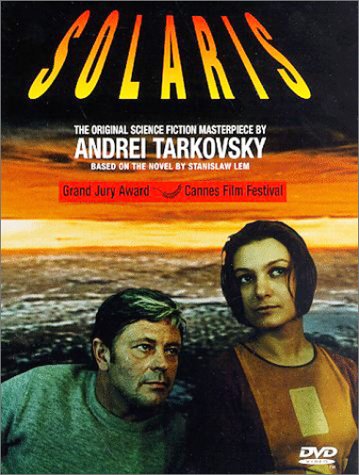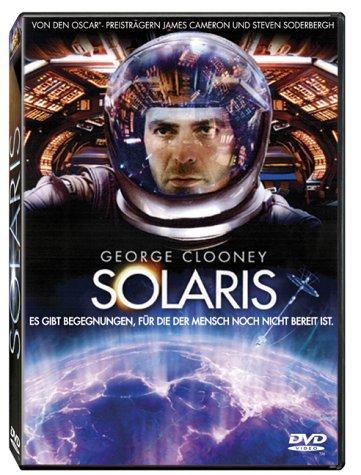Deep space travel is routine and many planets have been surveyed. There was nothing of interest about the planet Solaris and so it was ignored for years. An astronomer then noted that its orbit was odd. Because it circles a double star, one red and the other blue, its orbit should be erratic but it does not confirm to the laws of physics. (The same is often said of the fraternity brothers.)

Solaris receives closer inspection. It is nearly completely covered by an ocean with only a few rocky outcrops like a few tufts of hair on a bald man’s head. Landing parties use those but cannot find anything relevant, but they do see that the ocean’s motion is varied and unexpected. Again they wonder about the laws of physics. After years of study, the field of Solaristics concludes there is an intelligence in the ocean regulating the orbit by some means. The book is replete with a gentle satire about academic specialisation as an end-in-itself.
More studies fatten cvs and efforts to stimulate communication are made using radio waves, ion streams, pictures of Mother Teresa, neutrino bombardments, pamphlets, and an unauthorised use of intense x-rays and other more destructive means to no avail. Solaris seems immutable like reasoning with a Republican.
A research station is placed in orbit to observe with a crew of three on a three-year stint and has been there for years. Then the one day commander of this station a the time requests base to send a psychologist. Isolation in space does lead to mental problems so shrink Kris Kelvin is dispatched. The novel opens with his arrival and the preceding information emerges piecemeal.
No one greets him. Odd. No one seems to be about. Odd. Moreover, there is disorder everywhere. This is no way to run a space station! He finally finds one of the scientists cowering behind a barricaded door. The other scientist will not leave his lab and speak to Kris. The plot thickens.
The commander who asked for the visit committed suicide that very morning. Odd! What to do? Kelvin decides to examine the corpse in the best tradition of the police procedural. En route he hears barefoot steps and passes a large black woman in tribal dress. She blankly ignores him. He is astounded. That is only the beginning.
Cutting to the case, each member of the crew has a spectral guest. It is someone a memory of whom is found deeply etched in his psyche. This is not necessary someone he wants, but it is the deepest, most ingrained memory. In Kelvin’s case his guest is Harey, a girlfriend who also committed suicide, so that he feels guilt, regret, and remorse.
These guests, the crew concludes, are from the Solaris ocean which is engaged in a Communicate with the Humans Project of its own. The Solaris guests have assumed the identities they have because of the importance of the memories to each scientist. Once embodied the guest seems to know a lot but have no memories of specifics. Harey is sweet and clingy but has no idea how she came to be there, but strangely she knows things about Kelvin that occurred after her own death. Evidently to some extent the guest can tap the host’s mind. But the commander’s guest has remained after his death! Talk about overstaying a welcome!
Various methods are tried to analyse the guests and to eject them from the station but they keep coming back. Meanwhile, Kelvin finds it easy to have Harey around. They engage in many conversations as she becomes aware that she is some kind of aberration, clone, replicant, or dream.
She is a virtual reality girlfriend. She is self-conscious, intelligent, capable of learning but she can never be more than Kelvin’s memories of her. In that way she is limited, and realising all of this she grows despondent. Of course the fraternity brothers wanted to know whether she is full functional but that is not made explicit.
There are many conversations with one of the scientists about the ocean, god, creation, Amex bills, morality, metaphysics, ontology, bratwurst, on and on. It is talky. We never find out about the other guests, nor is there any contact with the ocean. It is all trip and no arrival.
Is the omnipresent but uncommunicative behemoth of the ocean of Solars a metaphor for…. Soviet Communism viewed from the observation platform of Poland? Or just a yarn?
It is a meticulously written and original work to read it today, let alone more than fifty years ago. I sat through the Soviet 1972 film version years ago without it making any impression on me apart from the cruel and unusual length of three turgid hours.
 The Grand Jury at Cannes is made of stronger stuff than am I.
The Grand Jury at Cannes is made of stronger stuff than am I.
But in the age CGI Über Alles I expect it will have to be done again one day. No, I have not seen the Yankee 2002 version either, well, except for some scenes that I came across somewhere.

Channel flipping, no doubt.
Skip to content
